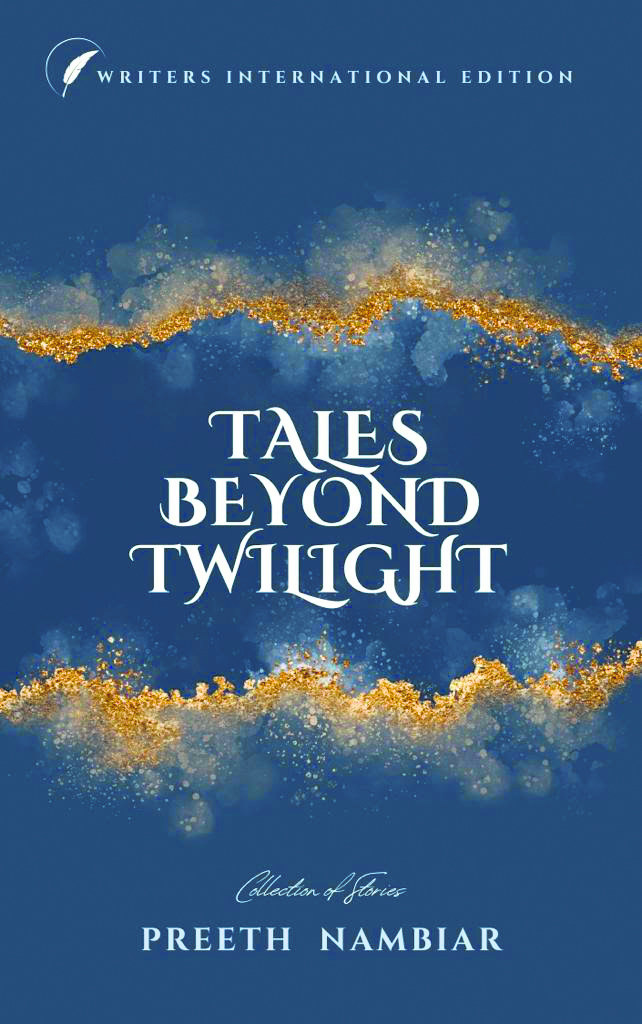
A piece of writing unfolds, rather than being consciously authored. The moment you proclaim, ‘I wrote a poem,’ it’s time to cease writing.” Preeth Nambiar
In the ethereal realms where metaphysical literature intertwines with humanitarian values, Preeth Nambiar emerges as a modern-day sage. A mystic poet, humanitarian and educationist, he champions the cause of global unity, transcending borders. The recently published collection of short fiction ‘Tales Beyond Twilight’ is a testimony to his poetic brilliance and shows the world how to add depth to fiction bringing profound themes into it. Here is a brief conversation with the saintly poet who often walks away from the crowd and prefers to be amidst the bounty of nature.
In the intricate tapestry of your literary works, how do you intentionally infuse metaphysical themes to create a unique and profound narrative experience?
Each writer boasts a distinct style, and the introduction of so-called metaphysical elements in my work wasn’t intentional. It likely sprang from my life’s past experiences, dominated by journeys aimed at self-discovery. This influence may also trace back to my early years in the tranquil rural landscape of Kerala, where nature, devotion, and innocence seamlessly interwove into the fabric of daily existence.
We observe substantial intervals between the release of your books. Could you shed light on your choice to refrain from frequent writing and publishing?
I contend that a piece of writing unfolds, rather than being consciously authored. I often advise fellow writers that the moment you proclaim, ‘I wrote a poem,’ it’s time to cease writing. Rather than asserting ‘I am writing,’ it’s about being the conduit through which an existing idea finds expression. Similar to the various stages in the conception of an idea leading to its eventual delivery, I find myself compelled to write only when a profound urge arises.
As the head of Writers Capital International Foundation, you’ve extended its reach to 87 countries. Can you share a key moment or initiative illustrating the foundation’s impact on global unity through literature? Ten years ago, my writing shifted significantly as I questioned the purpose of this craft. Beyond the inherent fulfilment in writing, I sought a broader significance for the gift of words. This contemplation gave rise to the Writers Capital Foundation, encouraging writers to infuse and spread the mighty values of humanity through their work. Living for others, even the smallest creatures, transforms existence into something extraordinary.
What inspired the Panorama International Arts & Literature Festival, and how does it feel to see writers and artists globally participating enthusiastically in this creative celebration?
The Panorama International Arts & Literature Festival is a globally significant meeting ground for writers and artists, delving into philosophical themes intertwined with societal issues. This year’s ‘Fire’ theme addresses urgent matters like global warming, igniting a call to action. Harnessing writers’ potent words, we aim to kindle transformative change. Incorporating cutting-edge technology seamlessly connects participants worldwide. What are your visionary plans for the future of writing, given your extensive involvement in literature, education, and global literary initiatives?
Prioritizing my personal writing has never been my primary focus. However, I’m currently in the process of crafting a poetry collection titled ‘The Passage to the Infinite.’ Moreover, I have a long fiction project that I commenced a few years ago. The completion of the long fiction piece may require further isolation, as it demands heightened focus and continuous engagement—a task that, at present, presents its own set of challenges.